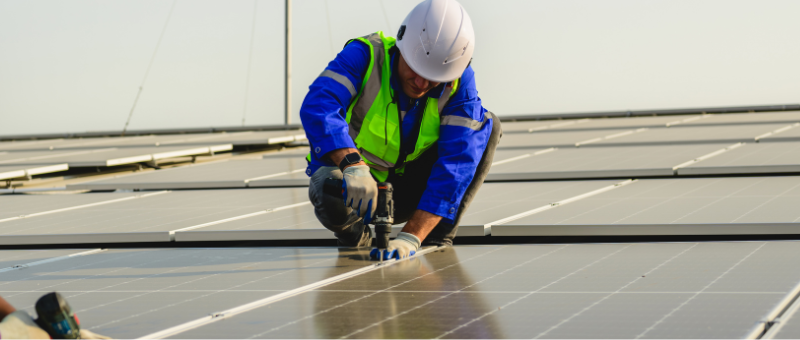How to Lower the Solar Panel Price for Home: Incentives and Rebates
In recent years, solar energy has emerged as a viable and sustainable alternative to traditional power sources. As the demand for clean energy increases, many homeowners are considering installing solar panels. However, the upfront cost can be a significant barrier. Fortunately, there are numerous incentives and rebates available in India that can significantly reduce the solar panel price for home installations. This blog will delve into these opportunities, helping you understand how to make solar energy more affordable.
Understanding the Solar Panel Price for Home
Before exploring the incentives and rebates, it’s essential to understand the factors that influence the solar panel price for home installations. These factors include:
System Size: The larger the solar panel system, the higher the initial cost. However, larger systems also generate more electricity, potentially offering greater savings in the long run.
Panel Type: Different types of solar panels (monocrystalline, polycrystalline, and thin-film) have varying costs and efficiencies.
Installation Costs: Labor and installation expenses can vary based on the complexity of the installation and the installer’s expertise.
Location: The amount of sunlight your home receives can influence the overall efficiency and cost-effectiveness of your solar panel system.
Government Incentives and Schemes
To encourage the adoption of solar energy, the Indian government has introduced several schemes and incentives:
- Subsidies: The Ministry of New and Renewable Energy (MNRE) provides subsidies for residential solar panel installations. These subsidies can cover up to 30% of the installation cost in general category states and up to 70% in special category states (Northeastern states, Uttarakhand, Himachal Pradesh, Jammu & Kashmir, and Lakshadweep).
- Grid-Connected Rooftop Solar Scheme (Phase II): This scheme aims to achieve a cumulative capacity of 40 GW from rooftop solar projects by 2022. Under this scheme, residential consumers are eligible for a subsidy on the benchmark cost of the system or the cost discovered through competitive bidding, whichever is lower.
- State-Specific Incentives: Several states offer additional incentives and rebates to promote solar energy. For example, Maharashtra, Gujarat, and Tamil Nadu have their own schemes that provide financial assistance to homeowners installing solar panels.
- Gujarat Solar Power Policy: Gujarat is a frontrunner in promoting solar energy through its comprehensive solar power policy. The state offers several incentives to reduce the solar panel price for home installations. Under the Gujarat Solar Power Policy, homeowners can avail of a subsidy of up to 40% on the installation cost of rooftop solar systems. Additionally, the state government provides net metering facilities, allowing homeowners to sell excess electricity back to the grid and receive credits on their electricity bills. The policy also facilitates easy financing options through banks and financial institutions, making it easier for residents to adopt solar energy.
- Tax Benefits: Homeowners can avail tax benefits under Section 80-IA of the Income Tax Act. This section allows a tax holiday for 10 consecutive years during the first 15 years of the solar power project.
Net Metering
Net metering is another significant factor that can reduce the solar panel price for home installations. It allows homeowners to sell excess electricity generated by their solar panels back to the grid. The surplus energy is credited to the homeowner’s electricity bill, effectively reducing their overall energy costs.
Financing Options
Several financing options are available to help homeowners manage the initial investment:
Solar Loans: Many banks and financial institutions offer loans specifically for solar installations. These loans come with attractive interest rates and flexible repayment options.
Solar Leasing: Some companies offer solar leasing options, where homeowners can lease the solar panels and pay a monthly fee. This arrangement eliminates the need for a significant upfront investment.
Power Purchase Agreements (PPAs): Under a PPA, a third party installs and maintains the solar panel system, and the homeowner agrees to purchase the electricity generated at a predetermined rate. This option also reduces the upfront cost and provides predictable energy pricing.
Solar Maintenance Services
While considering solar panel installation, it’s also crucial to account for ongoing maintenance. Investing in reliable solar maintenance services can ensure your system operates efficiently and lasts longer. Regular maintenance helps prevent issues that could affect the performance of your solar panels, ensuring you continue to benefit from reduced energy costs and optimal system efficiency.
Choosing the Right Installer
Selecting a reputable and experienced installer can also help reduce the overall solar panel price for home installations. A professional solar panel installation company can provide accurate cost estimates, ensure quality installation, and help navigate the available incentives and rebates.
Conclusion
The initial cost of installing solar panels can be daunting, but numerous incentives and rebates are available to make it more affordable. By taking advantage of government schemes, state-specific incentives like those in Gujarat, tax benefits, and financing options, homeowners in India can significantly reduce the solar panel price for home installations. Additionally, net metering and choosing the right installer can further enhance the financial viability of switching to solar energy. Embracing solar power not only reduces your electricity bills but also contributes to a greener and more sustainable future.




